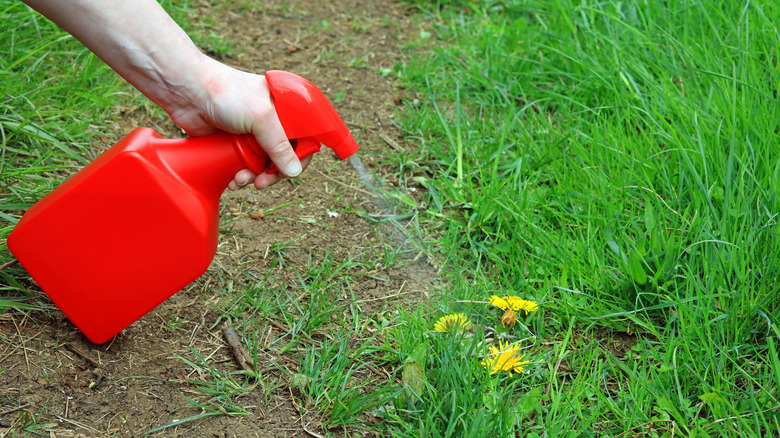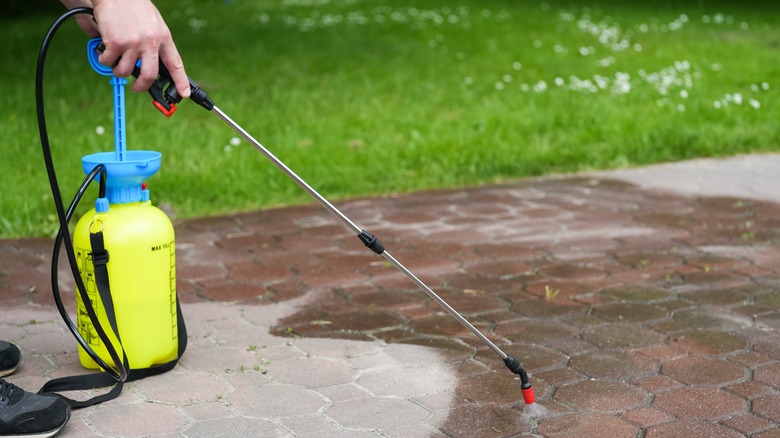The Popular Weed Killer You Should Think Twice About Using (& What To Use Instead)
An old proverb asserts that "a good garden may have some weeds," but too many of these uninvited guests requires action, and how we get rid of weeds in the garden could have a serious impact on our health. One of the most popular herbicides on the market may be causing harm to more than just the weeds themselves. Roundup first came on the scene in 1974, and according to the advocacy organization Consumer Notice, it's still the most widely used herbicide in agriculture and the second-most widely used in lawns and gardens. But there are far safer options that you can make with items you likely already have in your kitchen, like vinegar.
Roundup's inventor, Monsanto, has become a recognized name in the biotech industry, but not without controversy. The herbicide became widely used when Monsanto genetically engineered crops such as soybeans, corn, and cotton to become resistant to the spray. This means that the weeds around the crops are destroyed while the plant itself remains healthy.
While this is a panacea to farmers and gardeners, it may actually pose a health risk to humans, animals, and the greater environment. The chemicals in Roundup and other similar commercially available weed killers have come under great scrutiny in recent years.
Is Roundup safe?
Roundup's active ingredient is called glyphosate. It travels from the weed's leaves to its roots, where it prevents them from producing growth proteins. About 10 years ago, glyphosate was investigated as a potential carcinogen in humans for several types of cancer. In 2015, the World Health Association (WHO) determined that glyphosate is "probably carcinogenic to humans," but in 2016, the U.S. Environmental Protection Agency (EPA) did its own evaluation and determined that glyphosate poses very little health risk. Still, there is enough concern that at least 165,000 lawsuits have been filed against Roundup. Monsanto, which is now owned by Bayer, has paid billions of dollars in settlements.
Due to increasing concern, several countries have banned glyphosate. It's also been outlawed or restricted in localities in at least nine U.S. states. Additionally, it's banned in all organic farming in the U.S. because it's a synthetic, or unnatural, substance. And because it doesn't quickly degrade, glyphosate remains on crops as a residue that can enter the food supply. Exposure is believed to have deleterious effects on digestion, liver and kidney health, as well as reproductive and endocrine function.
Even if the dangers of glyphosate are proven to be overstated, some of the non-active ingredients in Roundup and similar herbicides are also potential health hazards. A 2022 study published by the National Institutes of Health showed that chemicals that make up the whole weed-killing "cocktail" were found to be 1000 times as harmful as glyphosate itself.
Safe alternatives to glyphosate
Due to ongoing litigation, Bayer has begun phasing out Roundup containing glyphosate for residential use. The company was also forced to stop advertising it as safe for humans and animals. This means gardeners will have to find alternatives to Roundup and, fortunately, there are many DIY weed killer tips available, including vinegar-based weed killer solutions that provide a safer alternative. To make this natural herbicide effective, a 20-30% vinegar concentration is recommended. At this strength, however, precautions must be taken to avoid skin contact. Care must also be taken not to overspray onto any plants you want to keep.
Another option for organic herbicide is citric acid, a common kitchen ingredient. The recipe is simple: add lemon juice (fresh squeezed or store-bought) to a spray bottle. You may have to reapply the next day, but the weeds should wilt or die within two days. For an even stronger solution, try a 1:1 mix of vinegar and lemon juice. It's recommended to apply any of these solutions on warm days with a sunny forecast.
You can also try administering a natural weed suppressant such as corn gluten to keep weeds off your lawn. Letting your grass grow longer, adding mulch to gardens, and growing groundcovers also prevent weeds from sprouting in the first place. If none of these measures ultimately prove satisfying enough, learning to live with a weed or two isn't proof of failure; it's a sign of a healthy, nontoxic growing environment.


